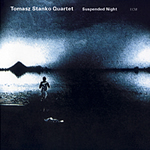|
|
 |
Dusted Reviews
Artist: Tomasz Stanko Quartet Album: Suspended Night Label: ECM Review date: Jun. 23, 2004 |

|
|
|
 |
When Bruce Wallace reviewed Tomasz Stanko’s last ECM album, Soul of Things, for Dusted, he discussed the filmic qualities of Stanko’s oeuvre, which Stanko himself has acknowledged. The Polish-born trumpeter cites not only Chet Baker and Miles Davis as influences in his development, but artists from diverse media, including film, visual art, and literature: Van Gogh, Faulkner, Modigliani. Stanko made a tribute album to the great Polish bandleader and film score composer, Krzysztof Komeda, 1997’s Litania, and a 1994 response to the film of Jerzy Kawalerowicz, Matke Joanna. Stanko also often laces titles of pieces with literary and film allusions.
I find it appealing to let my imagination work through the various media that Stanko’s latest ECM creation, Suspended Night, suggests: film, certainly, as an emotional yet minimalist masterpiece of a score; instruments wandering through exercises of method and chance like brushes of paint and ink; variations of still images, chiaroscuro shades of notes like rows of dripping, hanging photographs. The range of Stanko’s influence, the impetus even, found its roots in the political subversion that was European jazz in the height of the 1960s. European jazz in general was often a response to the ironclad fist of censure in the Communist governments that ruled Eastern bloc nations at the time, much like the experimentation of various movements alive and well in other artistic media in post-Fascist republics – Italian neo-realist cinema of the 1950s comes to mind. It is no accident that the cross-artistic-genre allusions of Stanko’s music are linked intimately with the political and social.
However, these mixed artistic and political elements to the music can make our experience of it a forum for excessive association. Music is only evocative of other creations – it is just music, and must be treated as such. Heard not as a score for an imaginary film or a response to a provocative piece of art but simply as the work of an aural-art improv ensemble, Suspended Night is a tightly cohesive work of skilled musicians, a minimalist’s delight when it comes to solos and rhythmic and melodic interplay. Stanko continues his close collaboration with the quartet of Marcin Wasilewski, Ssawomir Kurkiewicz, and Michal Miskiewicz, with whom he recorded the recent Soul of Things and has been touring constantly in the past few years. The four men share Polish nationality but their ears seem even more genetically linked than that, so polished and noticeably synchronous is their ensemble playing. Stanko often composes with this familiarity in mind, as on the album’s opening track, “Song for Sarah,” which relies on a motif of parallel piano and trumpet for its theme.
However, the ballad-toned “Song for Sarah” is unlike the “suspended” sessions that comprise the rest of the album, ten tracks numbered as a suite of the ensemble’s non-cohesive but incredibly coherent musical statements. Surprising to me, given his inventive work on Soul of Things, is Stanko’s initial reticence as a soloist, especially in slower pieces where Wasilewski’s piano chords swallow up the thinly-attenuated rhythm section and seem to call for Stanko to join. His presence does not overshadow other members, though he is the veteran of many seasons, but he slowly and subtly works up to moments of lucidity that burn the air with his crisp licks, and just as gradually backs away. Unlike some improv musicians, Stanko and Co. are not afraid of an airy pause between riffs, apparently comfortable enough in their cooperation to accept silence when it comes. Pieces move quietly from one section to another with the piano leading the transition one time, Stanko’s solo brass the next. Stanko’s compositions relegate the rhythm section to the background, though they do find room for some intriguing counterpoint within their role. The relative weight of rhythm and melody is what gives the quartet a very traditional-sounding feel, recalling Stanko’s early influences. And yet, his unique voice bleeds through, drawing his audience in from that familiar jazz quartet feel to his surprising moments, rather than sounding “weird” only to disappoint with lack of depth.
By Joel Calahan
|







